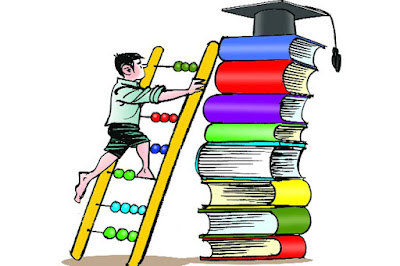The Limits of The Indian Education System
I wrote about the origin story of the Indian Education system (See An 'Indian' Education) to argue that 'Indianness' of Education does not necessarily have to be regressive, ritualistic or religious. The current tendency of relegating any discussion about an Indian Education to obscurantism cedes the space to Hindu Fundamentalists, who are left free to promote their particular, limited and historically inaccurate ideas. However, a culturally congruent education is much needed at a time when Indian society is at a crossroad, the pains of globalisation is hurting and the crisis of identity is real and urgent.
This post is a rejoinder to the earlier one. Here, I intend to expand my argument that the Indian system of education did not break out from its earlier, imperial, mode. This is a familiar argument that the cultural nationalists make all the time, but, since I didn't think that British imperial education was necessarily English-only (rather, it promoted the modern Indian vernaculars) or Christian (instead it was secular by design), my emphasis will be elsewhere. True, the British education system replaced Sanskrit and Persian as scholarly languages of India - and destroyed India's native education system by directing private philanthropic funding to government sanctioned schools - and introduced examination systems that became be-all and end-all of the process of education. But, we need to go beyond the symptoms and explore the motives to understand fully the transformation wrought by the imperial system.
That motive was to transform India into a market for British industrial products. The British 'Free Trade' imperialism successfully turned India into a huge market for British goods and services, and the education system was very much part of the same policy universe. This was the foundation of the 'consent-based' empire, and the education system sustaining this was built around an international division of labour. The point of the education system was to put the Indians in their place of the world, as workers and consumers in the vast global/imperial system.
This founding purpose, along with attendant institutional and instructional design, has been left mostly untouched in Independent India. The modern vernaculars eventually shaped the states in Independent India, appearing as self-evident formations, with Hindi, one of the modern vernaculars, becoming the official language of the Government of India. The government mandated, top-down, examinations obsessed structure remained the norm in India, discouraging innovation and new ideas, unless they are imported from the West. The centuries old connections between Indian education and culture and West and Central Asia were irretrievably lost, and a desire for all things European formed the core of the Indian Education system. The identities of the students were firmly moulded, then as now, as obedient recipients of knowledge, and a discerning consumer - not original thinkers, engaged republican citizens, interrogators of received wisdom or imaginative producer of new ideas.
It is a commonly observed paradox many docile and compliant Indian students suddenly find their mojo when they come to study in Western institutions, becoming creators, entrepreneurs and leaders of repute. The answer, I shall argue, lay in the foundational ideas of the Indian system of education, which was about knowing your place in the world - that of a back-office worker and consumer! Indeed, this constraint is well acknowledged and attempts are underway to import Western models into India to rectify this. This is treating the symptom rather than the disease, yet another attempt to buy into Western cultural norms, and accepting India's place in the global economic system as a recipient, rather than creator, of ideas.


Comments